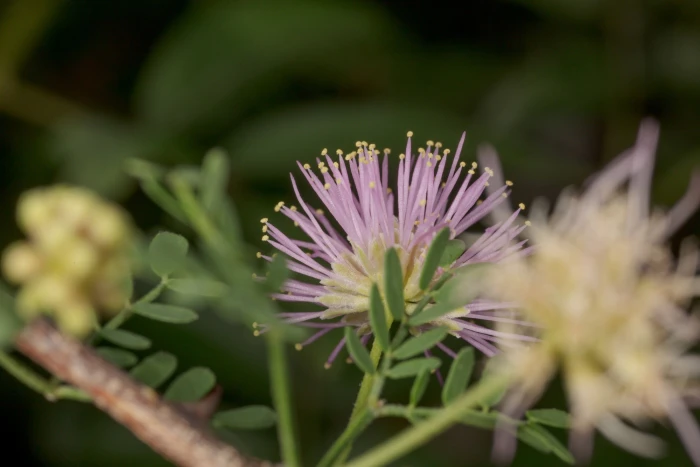Texas Mimosa
(Mimosa texana)
Texas Mimosa (Mimosa texana)
/
/

© Victor Engel
CC BY 4.0
Image By:
© Victor Engel
Recorded By:
Copyright:
CC BY 4.0
Copyright Notice:
Photo by: © Victor Engel | License Type: CC BY 4.0 | License URL: http://creativecommons.org/licenses/by/4.0/ | Uploader: victorengel | Publisher: iNaturalist |






















Estimated Native Range
Climate Requirements
| • Precipitation | 8" - 39" |
| • High Temp. | 72°F - 100°F |
| • Low Temp. | 25°F - 51°F |
Summary
Mimosa texana, commonly known as Texas Mimosa, is a deciduous shrub native to the semi-arid scrublands and limestone hills of northeastern Mexico and the southern tip of Texas, particularly in Zapata and Starr counties. It typically grows to a height of up to 7 feet tall and is characterized by its slender, zigzag twigs covered in backward-pointing prickles. The foliage consists of alternate, bi-pinnate leaves that provide a delicate, fern-like texture. During the summer months, Texas Mimosa produces creamy-white, fragrant flowers in fluffy, spherical clusters that are highly attractive to pollinators such as bees and butterflies. The flowers give way to distinctive brick red seed pods with prickly edges, which persist into the winter, adding visual interest.
Texas Mimosa is valued for its drought tolerance and ability to thrive in alkaline soils, making it a suitable choice for xeriscaping and naturalistic plantings in arid regions. Its fragrant flowers and textured foliage make it an appealing ornamental, while its prickly stems can provide a deterrent against browsing by wildlife. In cultivation, it requires minimal maintenance once established, preferring full sun and well-drained soils. It is not commonly used in urban planting due to its thorns, but it can be an excellent addition to wildlife gardens and restoration projects. Care should be taken as the plant can spread by seed, potentially becoming invasive in some areas.CC BY-SA 4.0
Texas Mimosa is valued for its drought tolerance and ability to thrive in alkaline soils, making it a suitable choice for xeriscaping and naturalistic plantings in arid regions. Its fragrant flowers and textured foliage make it an appealing ornamental, while its prickly stems can provide a deterrent against browsing by wildlife. In cultivation, it requires minimal maintenance once established, preferring full sun and well-drained soils. It is not commonly used in urban planting due to its thorns, but it can be an excellent addition to wildlife gardens and restoration projects. Care should be taken as the plant can spread by seed, potentially becoming invasive in some areas.CC BY-SA 4.0
Plant Description
- Plant Type: Shrub
- Height: 1.5-3 feet
- Width: 2-3 feet
- Growth Rate: Moderate
- Flower Color: Yellow
- Flowering Season: Spring, Summer, Fall
- Leaf Retention: Deciduous
Growth Requirements
- Sun: Part Shade
- Water: Low
- Drainage: Fast, Medium, Slow
Common Uses
Butterfly Garden, Deer Resistant, Drought Tolerant, Low Maintenance, Rabbit Resistant
Natural Habitat
Semi-arid scrublands and limestone hills of northeastern Mexico and the southern tip of Texas
Other Names
Common Names: White Mimosa, Catclaw Mimosa
Scientific Names: Mimosa texana, Mimosa borealis var. texana
GBIF Accepted Name: Mimosa texana